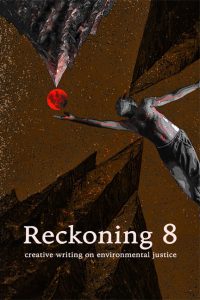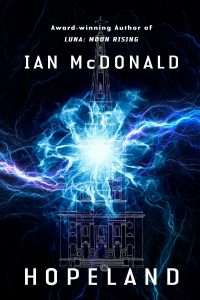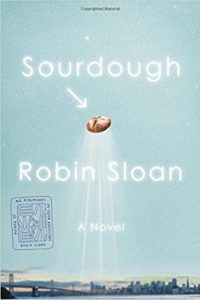Charles Payseur Reviews Short Fiction: Reckoning, F&SF, Strange Horizons and Worlds of Possibility
 Reckoning Spring ’24
Reckoning Spring ’24
F&SF 1-2/24
Strange Horizons 1/29/24, 2/5/24, 2/12/24
Worlds of Possibility 2/24
The new year brings a new issue of Reckoning, featuring poetry, fiction, and nonfiction focused on issues of environmental justice. Kelsey Day is among the poets complicating and keenly describing the intersections of ecological and social violation in “50% off Venus Fly Traps”, which finds a person plant shopping and running into the ways humans have bent the natural world in very unnatural ways. It’s not exactly natural selection, after all, when humans decide to save a plant or a species just because they like it, because it’s cute or because they like its aesthetic. And the narrator of the poem lingers on the topic, questioning the lines of consent and extinction, the way that humans might “save” something that their own pollution and spread have endangered in the first place. And, having destroyed the natural environment, the homes of these plants or animals, humans move them into gardens, into pots, into zoos – calling it conservation when it looks a lot like violation, like theft, like demanding something be grateful it wasn’t wiped out entirely, and in that Day captures a violent contradiction at the heart of how humans decide what to domesticate and what to eradicate. Staying with poetry, Oluwatomiwa Ajeigbe also looks at violence, extinction, and salvation in “That Time My Grandfather Got Lost in the Translations of the Word ‘Death”’. The piece describes an invasion of a place by a great behemoth that destroyed, and yet the local people build their own behemoth, a kind of mech suit that the narrator pilots, fighting back against and breaking the invader. And yet the damage done is not just the physical destruction of a place, not just the exploitation visited by foreign entities – the greatest impact is noticed only after victory, when the narrator believes he will die, and wants to pray, only to find that some of the words are missing, stolen, and suppressed by the very force he’s helped defeat. Ajeigbe captures a great tone in the poem, confident and strong and just bereft as well, not broken but still shaken by the realization of everything that has been lost, and how much worse it could have been. It’s a powerful read.
Moving to the issue’s fiction, Dan Musgrave tells a story about family, language, and tradition in “A Move to a New Country”. The narrator is a mammal specialist working to help his people reach into space to escape a dying Earth. But while he has an extra space reserved for him on the ship, his grandmother refuses to leave with him, even as her health declines. The piece revolves around the push and pull of place, of family, of history, of survival. The narrator is part of a project to save what can be saved, to do the terrible math of deciding who and how many of each species will go, including humans. And Musgrave links this decision, this movement, to the longer history of humanity and specifically the legacy of the bloody colonization of the Americas by Europeans and their descendants. The choice to use the Osage language and orthography further underlines that, showing a retention of identity and history despite the pressures to conform to colonial languages and symbols. The future is a place the narrator and his people will have to change to reach, just as they always have, but that doesn’t mean forgetting or fully leaving behind who they are or where they have been. It’s a beautiful story. Jeff Hewitt also looks at a future for humanity away from the planet Earth in “Where the Water Came From”, as water wars have pushed some, including a man named Tyrel, to volunteer for a long-term space trip to colonize a barren planet in return for the safety of his family on Earth. However, by the time the ship and the sleeping passengers arrive seventy years later, advances in technology mean the planet is already booming with industry, and the survivors are absorbed into the flow of labor being exploited there. And, almost by accident, Tyrel finds himself being pulled into a leadership position in a growing movement to organize, resist, and demand more from the corporate interests that have largely slipped free of regulation and constraint in the final frontier of space. Hewitt captures nicely the pressures keeping Tyrel and the rest of the survivors mostly complacent – a sense of being lost, a desire not to lose the connections to their past that the company controls, an isolation from the greater human expanse – that evencombined aren’t enough to crush the social needs of humans to form bonds and communities and push, ultimately, for freedom.
The January/February F&SF took a little longer than normal to reach the hands of reviewers, but it’s definitely worth the wait, as it provides some fantastic works, including Denzel Xavier Scott’s debut story at the publication, “Zariel: Parable of a Gifted Black Child”, In it, a mother and child are witnessing the approach of a giant asteroid. Only, it’s not exactly an asteroid, as the child, Zariel, knows well. It’s more than that, and it’s coming for them specifically. It also causes a panic, though, and panics can be very dangerous indeed, especially for those who are deemed threats from birth, like gifted Black children, in places where the history of violence against them is so ingrained, so deep, and so rampant that no amount of being reasonable, or calm, or obedient, can guarantee against murder. Luckily for Zariel and their mother, though, this story does not feature the expected tragedy – not exactly. What Scott does instead is explore possibility and strangeness, finding for Zariel a way out of the violence through power and through the gifts they no longer need to hide from the prejudices that would demand they diminish to assuage the unreasonable and insatiable fears surrounding their potential. It’s a visceral and powerful read. Dane Kuttler’s “The Interspatial Accessibility Compact’s Guidelines for Cross-Cultural Engagement” is, in contrast, a bit more on the light and humorous side of things, finding the narrator and horticulturalist, Sri, trying to help a human, Tadaaki, who has come in because he wants to buy a flower as a romantic gesture toward his non-human co-worker. The piece lingers in the very large differences between human and various alien cultures, as Sri acts as the long-suffering foil to human impulses toward danger and disaster. It’s very cute, very warm, and rather hilarious, as Tadaaki just has to be so human about everything, wanting actions to speak louder than words without considering that for many people – and peoples – words can prevent a lot of misunderstanding and hurt feelings. Kuttler crafts a captivating and charming story.
Richard Leis makes an F&SF poetry debut with “Cities Through Telescopes”, which finds anarrator facing the death of their father – a slow death, it seems, in a hospital – as the possibilities of life are found on distant worlds and moons. The piece contrasts the march of the father’s illness with the discoveries of alien ruins, with the exploration of Europa’s internal oceans. Life, out among the stars, and yet on Earth a man is dying, and the narrator is caught between it all, between a personal tragedy and the realization that the universe might be full of once-flourishing worlds left barren. There is a distance in both cases, though, as death remains a mystery that the narrator can witness only through a lens, at a remove, while waiting for further revelations to cut through the presence of omnipresence of loss and hope. It’s lovely and a bit haunting. Which pairs quite well, really, with Will McMahon’s “Do Not Hasten to Bid Me Adieu”, which unfolds as a series of letters between Henry, living in the later 1930s East Coast America, and his far-off descendent, Inanna, who lives in a future where she is a princess of a galactic empire and is expected to marry a political rival her father’s age for the sake of politics. Despairing her options, she found a device that allows her to communicate with the past, and asks her ancestors for advice about what to do. Henry takes it in stride, and the two connect, helping each other through their difficulties and finding that while sorrow and loss are both things that connect them through time, so are love and family. And while the story finds that the arc of history doesn’t always lean toward justice, it might resemble more a game of chutes and ladders, and for one young space princess and one lonely old man, that structure opens the door for both of them to reach of their own happier endings. Which is wonderfully done.
Strange Horizons closed out January with a special issue dedicated to criticism, which has become something of an annual event. On top of the sharp nonfiction works, the issue also features a few poems that themselves act as a kind of commentary and criticism of literary traditions, tropes, and figures, as in Devan Barlow’s “Dear Charles Perrault”. From the start the poem takes something of an adversarial tone with regards to Perrault, finding in his fairy tales and stories a rejection of certain older forms of storytelling – a stripping out of folklore and religions for more modern sensibilities, and yet leaving untouched and uncommented on the pillars of class, gender, and power. The piece sharply examines the telling ways in which Perrault sought to create a philosophical and intellectual justification for his works while relying on the support of the monarchs and influential men of the time whose power in those stories was held as absolute and just. And the narrator of the poem, rejecting such a shallow restructuring of the canon, dares more and stands behind the power and potential of their own choices to shape the world without the permission of kings, husbands, or fathers. Moving into February, Malda Marlys’s “Of Flowing Stone, of Liquid Gold, of Justice, Ash and Battle” features a volcano god going out into the world at the head of an army, creating an empire. And yet the heart of this empire is not violent conquest but rather a desire that everyone have enough. There is no battle where people can be convinced that the cause is just. And people are fed, and prayers are listened to, despite the toll it takes on the god, the weight of all those needs and expectations that they feel acutely. Marlys captures the grinding need for vigilance and effort to keep a power from corrupting, to keep an empire built for the “noblest” of reasons from becoming the very thing it was trying to prevent. It recognizes in that process there is no real rest, no arriving at a solution or final destination. It’s all a process, and a difficult one requiring invention and reinvention. It’s a story that challenges the literary desire for a happy ending, and does so in a profound and moving way.
The February Worlds of Possibility leans into the romantic connotations of the month and Valentine’s day, but with some interesting and at times grim twists. Sara Norja kicks off the issue with “In Winter, A Wedding”, a poem that frames a rather tragic story about a man transformed into the prince of owls being forced to marry a queen of the fair folk. Norja does interesting work in changing perspectives throughout the story, revealing the scene from the eyes of the cursed man, the cruel queen, the officiant, and even the witness, who has her own role to play in the proceedings. The result is a poem that’s also a fairy story, and one that winds through the possibilities of tragedy before reaching something triumphant and joyous. It’s a lovely and rather romantic read. A.Z. Louise’s story “Bone and Marrow, Root and Stem” also deals with the fae, opening on Jess, a human who was taken by the fae and replaced by a changeling. After years in their courts, Jess was released, but without a solid memory of what happened, and with a magical sword as quasi-recompense. She has little reason to trust the fae, but when she receives a call for aid, something still pulls her to an old mall where Abeille, an elf, is on the verge of being unbound from her place of power, something that might well kill her. And though Jess doesn’t remember why she should care, she finds that she does, and finds out that Abeille means more to her than she could have guessed. It’s a mysterious piece full of quick revelations and quicker blades, Jess thrust into the center of something bigger than her, bigger than Abeille – but maybe not bigger than the feelings they have for each other. It’s an action-packed, very fun story.
Recommended Stories
“A Move to a New Country”, Dan Musgrave (Reckoning Spring ’24)
“Where the Water Came From”, Jeff Hewitt (Reckoning Spring ’24)
“Zariel: Parable of a Gifted Black Child”, Denzel Xavier Scott (F&SF 1-2/24)
“The Interspatial Accessibility Compact’s Guidelines for Cross-Cultural Engagement”, Dane Kuttler (F&SF 1/-2/24)
“Of Flowing Stone, of Liquid Gold, of Justice, Ash, and Battle”, Malda Marlys (Strange Horizons 2/24)
“Bone and Marrow, Root and Stem”, A.Z. Louise (Worlds of Possibility 2/24)
Charles Payseur is an avid reader, writer, and reviewer of speculative fiction. His works have appeared in The Best American Science Fiction and Fantasy, Lightspeed Magazine, and Beneath Ceaseless Skies, among others, and many are included in his debut collection, The Burning Day and Other Strange Stories (Lethe Press 2021). He is the series editor of We’re Here: The Best Queer Speculative Fiction (Neon Hemlock Press) and a multiple-time Hugo and Ignyte Award finalist for his work at Quick Sip Reviews. When not drunkenly discussing Goosebumps, X-Men comic books, and his cats on his Patreon (/quicksipreviews) and Twitter (@ClowderofTwo), he can probably found raising a beer with his husband, Matt, in their home in Eau Claire, Wisconsin.
This review and more like it in the April 2024 issue of Locus.
 While you are here, please take a moment to support Locus with a one-time or recurring donation. We rely on reader donations to keep the magazine and site going, and would like to keep the site paywall free, but WE NEED YOUR FINANCIAL SUPPORT to continue quality coverage of the science fiction and fantasy field.
While you are here, please take a moment to support Locus with a one-time or recurring donation. We rely on reader donations to keep the magazine and site going, and would like to keep the site paywall free, but WE NEED YOUR FINANCIAL SUPPORT to continue quality coverage of the science fiction and fantasy field.
©Locus Magazine. Copyrighted material may not be republished without permission of LSFF.







